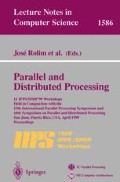Abstract
A multimedia system consists of substantial amount of continuous media workload scheduled periodically at deterministic time points. Phased scheduling is achieved by shifting phase or the lag between the invocation times of independent periodic tasks. A proper phase configuration distributes workload uniformly over time and reduces task interference that may otherwise result in jitter, deadline miss, and long response time. In our previous work, an algorithm is proposed that identifies optimal phase values for given periodic task set scheduled earliest deadline first[1]. We now present another phase identification algorithm and evaluate its effectiveness. The algorithm in this paper is less accurate but faster than the previous algorithm. In addition, the new approach is applicable to wider set of problems.
Preview
Unable to display preview. Download preview PDF.
References
J. Koh and H. Shin. Phased scheduling of continuous media tasks to improve quality of service. In IEEE International Conference on Multimedia Computing and Systems, pages 108–117, 1998.
R. Steinmetz, Analyzing the multimedia operating system. IEEE Multimedia, 2(1):68–84, Spring 1995.
C. L. Liu and J. W. Layland. Scheduling algorithms for multiprogramming in a hard-real environment. Journal of the Association for Computing Machinery, 20(1):46–61, 1973.
J. Koh and H. Shin. Distributing periodic workload uniformly across time to achieve better service quality. Technical Report http://cselab.snu.ac.kr/member /alcohol/rts.ps, Computer Engineering Dept., Seoul National University, 1998.
Karsten Schwan and Hongyi Zhou. Dynamic scheduling of hard real-time tasks and real-time threads. IEEE Trans. on Software Engineering, 18(8):736–748, Aug. 1992.
Author information
Authors and Affiliations
Editor information
Rights and permissions
Copyright information
© 1999 Springer-Verlag
About this paper
Cite this paper
Koh, J., Kim, K., Shin, H. (1999). Distributing periodic workload uniformly across time to achieve better service quality. In: Rolim, J., et al. Parallel and Distributed Processing. IPPS 1999. Lecture Notes in Computer Science, vol 1586. Springer, Berlin, Heidelberg . https://doi.org/10.1007/BFb0097925
Download citation
DOI: https://doi.org/10.1007/BFb0097925
Published:
Publisher Name: Springer, Berlin, Heidelberg
Print ISBN: 978-3-540-65831-3
Online ISBN: 978-3-540-48932-0
eBook Packages: Springer Book Archive

